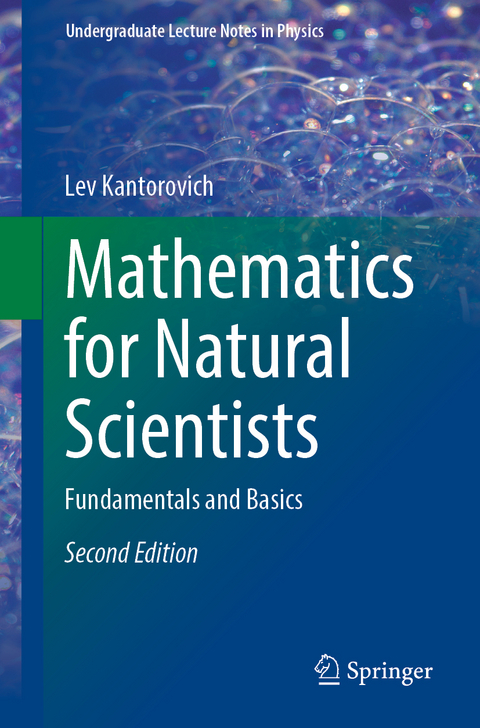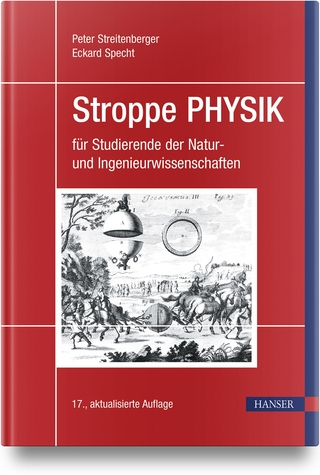
Mathematics for Natural Scientists
Springer International Publishing (Verlag)
978-3-030-91221-5 (ISBN)
This book, now in a second revised and enlarged edition, covers a course of mathematics designed primarily for physics and engineering students. It includes all the essential material on mathematical methods, presented in a form accessible to physics students and avoiding unnecessary mathematical jargon and proofs that are comprehensible only to mathematicians. Instead, all proofs are given in a form that is clear and sufficiently convincing for a physicist. Examples, where appropriate, are given from physics contexts. Both solved and unsolved problems are provided in each section of the book. The second edition includes more on advanced algebra, polynomials and algebraic equations in significantly extended first two chapters on elementary mathematics, numerical and functional series and ordinary differential equations. Improvements have been made in all other chapters, with inclusion of additional material, to make the presentation clearer, more rigorous and coherent, and the number of problems has been increased at least twofold. Mathematics for Natural Scientists: Fundamentals and Basics is the first of two volumes. Advanced topics and their applications in physics are covered in the second volume the second edition of which the author is currently being working on.
lt;p>Professor Lev Kantorovich studied theoretical condensed matter physics at the University of Latvia, Riga, Latvia (former part of the USSR), defended his Ph.D. in 1985 in the group of Alex Shluger (currently, at University College London, UK), and then worked at the University of Latvia and the Latvian Medical Academy. From 1993 to 1994, he worked as Visiting Scientist at the University of Oviedo, Spain, and he went on to hold postdoctoral positions at the University of Keele (1994-6) and University College London (1996-2002), both in the UK. Since 2002, he has worked at King's College London, initially as Lecturer, then as Reader, and, from 2009, as Professor of Physics. His research interests include the development and application of computational methods for material science, imaging and manipulation at surfaces with atomic probes (AFM and STM), self-assembly of molecules on surfaces, order-N DFT-based methods, quantum conductance with non-equilibrium Green's functions methods, dynamics of open quantum systems using path-integral methods, development and applications of the kinetic Monte Carlo method in growth phenomena, and classical and quantum generalized Langevin equation methods.
Part 1: Fundamentals.- Chapter 1. Basic knowledge.- Chapter 2. Functions.- Part 2: Basics.- Chapter 3. Derivatives.- Chapter 4. Integral.- Chapter 5. Functions of many variables: di erentiation.- Chapter 6. Functions of many variables: integration.- Chapter 7. Infinite numerical and functional series.- Chapter 8. Ordinary Di erential Equations.
| Erscheinungsdatum | 05.04.2022 |
|---|---|
| Reihe/Serie | Undergraduate Lecture Notes in Physics |
| Zusatzinfo | XXIII, 768 p. 189 illus., 163 illus. in color. |
| Verlagsort | Cham |
| Sprache | englisch |
| Maße | 155 x 235 mm |
| Gewicht | 1193 g |
| Themenwelt | Naturwissenschaften ► Physik / Astronomie ► Allgemeines / Lexika |
| Naturwissenschaften ► Physik / Astronomie ► Theoretische Physik | |
| Schlagworte | Condensed matter physics • curvilinear coordinates • Engineering Mathematics • Functions of Many Variables • Mathematical methods in physics • Mathematics for engineering students • Mathematics for physics students • Mathematics of physical sciences • Math for engineering students • Math for physics students • Math for the physical sciences • Math used in physics and engineering • Ordinary differential equations |
| ISBN-10 | 3-030-91221-3 / 3030912213 |
| ISBN-13 | 978-3-030-91221-5 / 9783030912215 |
| Zustand | Neuware |
| Informationen gemäß Produktsicherheitsverordnung (GPSR) | |
| Haben Sie eine Frage zum Produkt? |
aus dem Bereich


